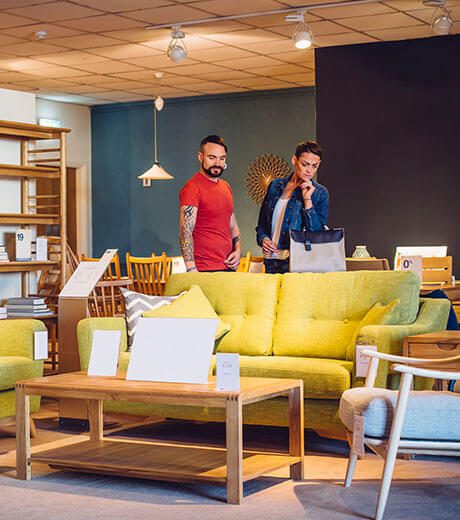Did you know: 83% of consumers surveyed agree that a brand’s sustainability is important (IBM Survey, Oct 2020)? Sustainability is a word that has been doing more than just trending – it’s impacting the way we view brands and ourselves. Sustainability has been a critical growth area for some of the largest companies, including Nike, Unilever, and Lego. Still, the United Nations has stated that only 46% of surveyed private businesses want to implement Sustainable Development Goals (SDGs) into their business model. What do some of these larger brands understand about sustainability that others still need to grasp? This article will examine what it means to be a “sustainable home furnishings business” and why sustainable businesses enjoy many additional benefits.
What is a sustainable business?
A sustainable business is one whose actions have minimal impact on the environment. Since all organizations accrue some environmental impact, minimizing impact is a conscious decision the business implements as part of a strategic initiative.
The Top 3 Business Benefits of Sustainability
1) You connect with your customers
92% of consumers are likelier to trust a company that supports social or environmental issues (Cone Communications, 2017).
Consumers connect with brands that value the same things they do. Showing your store’s support for reducing climate change reveals part of your organization’s values, adding an element of humanity to your brand.
Studies show that the younger generation is the most responsive to CSR (corporate social responsibility) initiatives – with 37% percent of American Generation Z consumers reporting that they are willing to pay a premium for environmentally sustainable products (Statistica Report, November 2020).
2) You increase employee engagement
75% of the Millennial Generation want to work for a company that “cares about how it impacts and contributes to society” (Surveys by Cone INC).
With more home furnishings stores embracing a purpose-led business model, ensuring your store has a clear environmental and social impact plan is more important than ever for recruitment purposes. Working for an organization whose values align with their own is so essential that in a survey conducted by the nonprofit Net Impact, 45% of workers agreed they would take a 15% pay cut for a job that makes a social or environmental impact.
Leveraging your sustainability initiatives will not only help you attract talent but will help you keep employees engaged. The same Net Impact survey shows that 53% of workers said that “a job where I can make an impact” is important to overall happiness on the job.
3) It’s better for the bottom line
Pursuing sustainability in a way that creates value can result in incredible results for your business’s bottom line. According to a 2012 research study conducted by Deutsche Bank, which evaluated 56 studies of companies with high ESG (environmental and social goal) ratings, 89% of the companies outperformed the market in the medium (three to five years) and long (five to ten years) term.
Environmental initiatives can help the bottom line in many ways, including mitigating the risk of loss due to government regulations and reputation risks and creating opportunities for product innovation and expansion to new market segments.
Having a sustainable home furnishings business is the way of the future. It means growth for your business, a stronger connection with your customers, and happier employees. For you, sustainability should no longer be a question of “why” but of “why not”?














